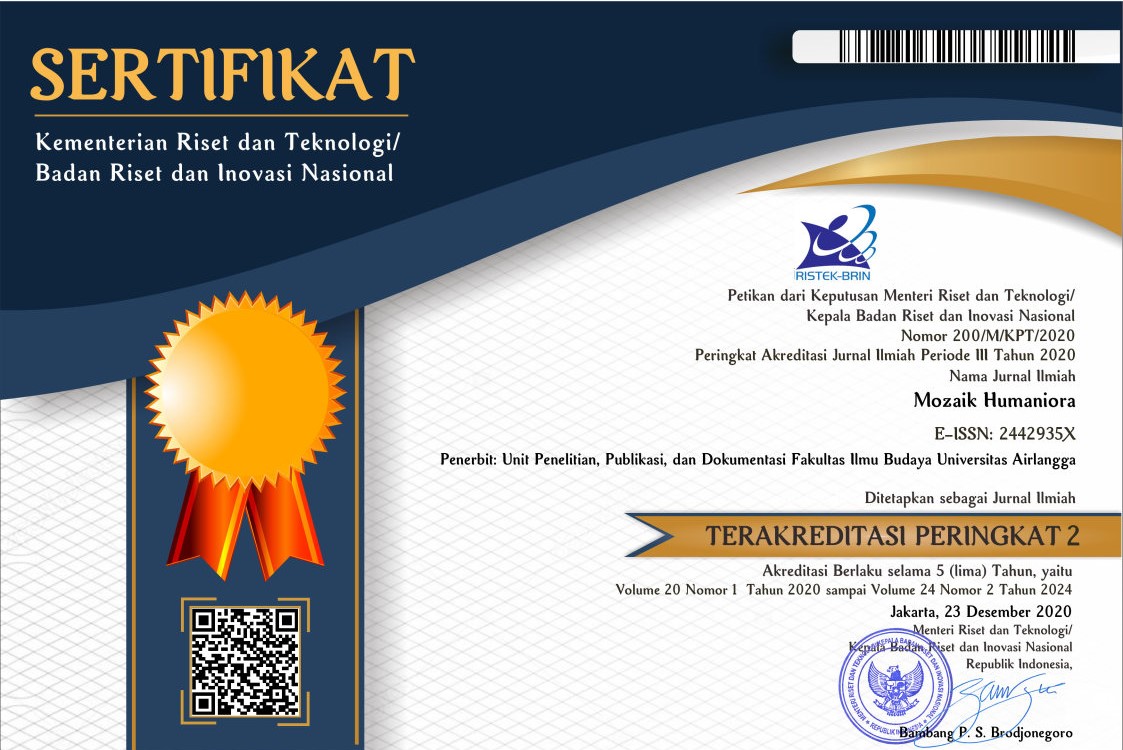Re-Homing and Identity Reconstruction of Diaspora in Jhumpa Lahiri's "When Mr. Pirzada Came to Dine”
Downloads
This study aims to analyse and describe how diaspora characters in "When Mr. Pirzada Came to Dine” reconstructed their identity and negotiate the process of re-homing in their current home. "When Mr. Pirzada Came to Dine” short story (WMPCD), written by Jhumpa Lahiri, depict the complex relation of identity and home experienced through diaspora characters, Pirzada and Lilia's family. To pursue the objective of the study, qualitative descriptive approach was used together with Laurenson' and Swingewood's sociological criticism theory, Castells' identity formation, and Zhang's re-homing theory. The results of this study indicated that the process of re-homing depicted in WMPCD has a significant impact on the identity formation of diaspora characters, in this case, Pirzada and Lilia's family. It means that the diaspora process of identity construction will not be efficiently completed since identity, particularly for diaspora individuals, will continue to be established and reconstructed in the context of the identity-forming resources accessible in their new ‘home' and what they bring from their homeland. When it comes to re-homing and de-homing, the process of navigating this identification is becoming increasingly complex and sophisticated. ‘Home' is no longer exclusively defined geographically as location, but by time and the people who contribute to forming personal ties to similar experiences. In short, re-homing becomes an essential element of the identity reconstruction process
Abrams, M. H. 1953. The Mirror and The Lamp: Romantic Theory and The Critical Tradition. Oxford: Oxford University Press.
Bartwal, Dhanesh. 2016. "Diasporic Sensibility in Jhumpa Lahiri's "When Mr. Pirzada Came to Dine.” Research Front 4 (4), 9-16.
Castells, Manuel. 2010. The Power of Identity. Oxford: Blackwell Publishing.
Clifford, James. 1994. "Diasporas.” Cultural Anthropology 9 (3), 302-338.
Deb, Paromita. 2014. "The Journey of Food from ‘When Mr. Pirzada Came to Dine' to ‘Mrs. Sen's' in Lahiri's Interpreter of Maladies.” South Asian Diaspora 6 (1), 121-135.
Dwivedi, Kumar. 2012. "Literature of the Indian Diaspora.” Transnational Literature 4 (2).
Edwards, Brent. 2014. "Diaspora.” In Keywords for American Cultural Studies, edited by B. Burgett and G. Hendler. New York: NYU Press.
Gillespie, Tim. 2010. Doing Literary Criticism: Helping Students Engage with Challenging Texts. Stenhouse: Stenhouse Publishers.
Hu-DeHart, Evelyn. 2015. "Diaspora.” In Keywords for Asian American Studies, edited by C. Schlund-Vials, L. Võ, and K. Wong. NYU Press.
Lahiri, Jhumpa. 1999. Interpreter of Maladies: Stories of Bengal, Boston and Beyond. London: Harper Collins.
Laurenson, D. and A. Swingewoo. 1972. The Sociology of Literature. London: Granada Publishing Limited.
Nasser, Shaden. 2019. "Conceptualizing ‘Transnational Homes' in Jhumpa Lahiri's "Mr. Pirzada Came to Dine” and "Mrs. Sen's.” Journal of Education Faculty of Ain Shams University 25 (2), 15-44.
Panda, Prasenjit and Abhisek Bhakat. 2015. "Reflections upon the Silver Linings of Diasporic Existence in Jhumpa Lahiri's "When Mr. Pirzada Came to Dine” and "The Third and Final Continent.” Phenomenal Literature 1 (2), 166-178.
Shanon, George. 1988. "Making a Home of One's Own: The Young in Cross-Cultural Fiction.” The English Journal 77 (5), 14-19.
Tölölyan, K. 2003. "The American Model of Diasporic Discourse.” Diasporas and Ethnic Migrants: German, Israel, and Post-Soviet Successor States in Comparative Perspective, 56-73.
Zhang, Benzi. 2004. "The Politics of Re-Homing: Asian Diaspora Poetry in Canada.” College Literature 31 (1), 103-125.

Mozaik Humaniora is licensed under a Creative Commons Attribution-ShareAlike 4.0 International License. Both authors and Mozaik Humaniora agree with the following attribution of journal:
1. Copyright of this journal is possession of Author, by the knowledge of the Editorial Board and Journal Manager, while the moral right of the publication belongs to the author.
2. The journal allows the author(s) to retain publishing rights without restrictions
3. The legal formal aspect of journal publication accessibility refers to Creative Commons Attribution Share-Alike (CC BY-SA).
4. The Creative Commons Attribution Share-Alike (CC BY-SA) license allows re-distribution and re-use of a licensed work on the conditions that the creator is appropriately credited and that any derivative work is made available under "the same, similar or a compatible license”. Other than the conditions mentioned above, the editorial board is not responsible for copyright violation.


















